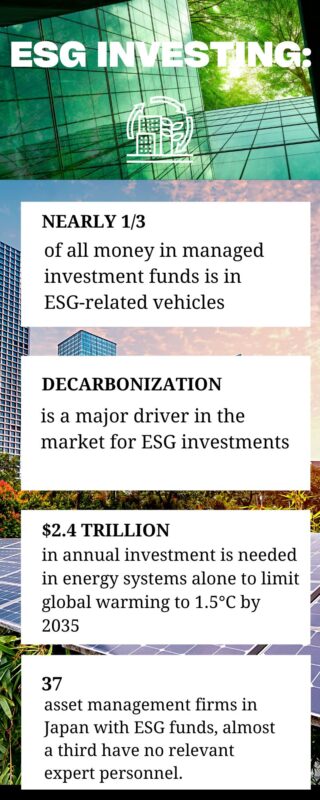ESG Investing: a Trend Both Hard to Pin Down and Here to Stay

Nearly third of all the money in managed investment funds is currently estimated to be in ESG-related vehicles. In theory, this means tens of trillions of dollars are being put to good use in solving the world’s environmental, social and (corporate) governance problems. The reality is more complex, but the ESG trend is not going away anytime soon, and is increasingly making its presence felt in Japan.
Defining what actually constitutes ESG is the first hurdle. Because each passing extreme weather event focusses minds on climate change, it is the E part of the equation that inevitably attracts the most attention. And in terms of market size, the decarbonisation process is going to be a major driver of innovation and commerce.
Huge threats, huge opportunities
The UN Intergovernmental Panel on Climate Change estimates that to limit global warming to 1.5°C above pre-industrial levels — a target set to avoid the worst consequences of climate breakdown — requires annual investment of approximately $2.4 trillion in energy systems alone until 2035. That represents about 2.5 percent of global GDP and does not take into account the action necessary in multiple other sectors.
While the environmental issues to be tackled are vast and numerous, in many ESG ratings and evaluations, the three elements are given equal weight. What such ratings represent is the source of another misconception. Many people believe high scores show that companies are, for example, protecting the planet. In fact, it usually means that they have low exposure to the risks of climate breakdown; the same principle holds true for the social and governance elements.
How and what to measure
Another issue is the lack of agreed upon evaluation criteria or methodology to assess ESG. The big ratings firms Moody’s, Fitch and S&P have created their own ESG scoring systems, while specialist outfits such as Sustainalytics have sprung up, alongside a patchwork of certifying organisations. There is also a growing legion of ESG advisory firms.
To some extent, asset managers have been able to put the ESG name on almost any fund, and companies have claimed all manner of sustainable and socially responsible credentials, with little external oversight or accountability. This though is changing, and the EU has already passed stricter regulations on ESG investment funds, with more stringent rules on related reporting by companies on the way.
Stakeholder capitalism
In Japan, there was an affinity for some aspects of ESG long before it had been given that name. Japanese capitalism traditionally had more concern than usually seen elsewhere with stakeholders, including suppliers and employees, and issues beyond just the bottom line.
The belief that there are people other than shareholders who should be listened to, along with a reluctance to lay off staff and shutter unprofitable divisions or subsidiaries, often draws criticism from foreign investors. But such tenets are aligned with various ESG principles.
Helping to bolster and advance the trend, the Japanese government has been taking steps to encourage ESG investing in recent years. For example, in 2017 Stewardship Code came into effect, setting out guidelines for institutional investors to engage with the companies they invest in and promote good corporate governance.
The 192 trillion yen ($1.45 trillion) Government Pension Investment Fund (GPIF) began including ESG indicators in its investing decisions in 2017. The largest such fund in the world, the GPIF issued a joint statement with the California State Teachers’ Retirement System and the UK’s Universities Superannuation Scheme in 2020 committing to sustainable investing. “If we were to focus purely on short-term returns, we would be ignoring potentially catastrophic systemic risks to our portfolios,” the funds jointly declared.
Greenwashing and how to avoid it
Following the identification and addressing of such concerns in Europe, authorities in Japan have begun looking at the phenomenon of ‘greenwashing’ or ‘ESG washing’ – exaggerations or unfounded claims by companies or funds. The Financial Services Agency (FSA) issued a report in May noting that out of the 37 asset management firms in Japan with ESG funds, almost a third have no relevant expert personnel.
Similar problems exist at many of the companies being invested in: a lack of in-house talent to implement and assess ESG standards. Meanwhile, in the private equity (PE) space, funds in Japan are also somewhat behind the curve in terms of ESG. But there too, change is afoot. In addition to pressure from pension funds and other investors on ethical investing, there is growing evidence that neglecting ESG factors increases risks and therefore potentially damages returns. Such rationales will always resonate with both PE and asset managers.
In July, the FSA released a voluntary code of conduct for ESG evaluations and data providers, but it is currently unclear whether or when Japan will follow the EU with stricter compulsory regulations. Whatever happens, the need for ESG experts at asset managers, PE and the companies they invest in is almost guaranteed to grow.
By Gavin Blair
To find out more about hot roles in Finance and elsewhere please contact us at +81-3-5962-5888 or email us at info@slate.co.jp

